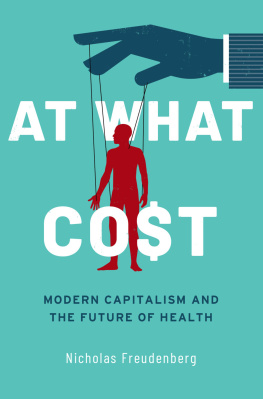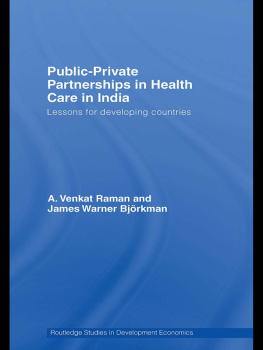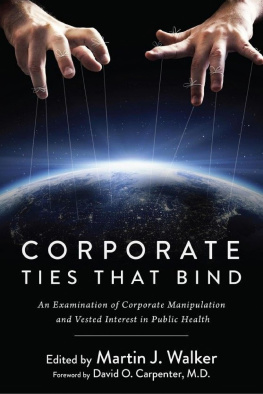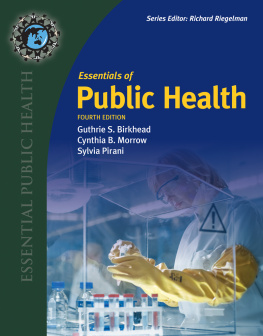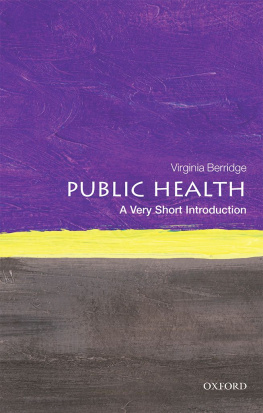Lethal but Legal
Lethal but Legal
CORPORATIONS, CONSUMPTION, AND PROTECTING PUBLIC HEALTH
NICHOLAS FREUDENBERG


Oxford University Press is a department of the University of Oxford.
It furthers the Universitys objective of excellence in research, scholarship,
and education by publishing worldwide.
Oxford New York
Auckland Cape Town Dar es Salaam Hong Kong Karachi
Kuala Lumpur Madrid Melbourne Mexico City Nairobi
New Delhi Shanghai Taipei Toronto
With offices in
Argentina Austria Brazil Chile Czech Republic France Greece
Guatemala Hungary Italy Japan Poland Portugal Singapore
South Korea Switzerland Thailand Turkey Ukraine Vietnam
Oxford is a registered trademark of Oxford University Press
in the UK and certain other countries.
Published in the United States of America by
Oxford University Press
198 Madison Avenue, New York, NY 10016
Nicholas Freudenberg 2014
All rights reserved. No part of this publication may be reproduced, stored in a retrieval system, or transmitted, in any form or by any means, without the prior permission in writing of Oxford University Press, or as expressly permitted by law, by license, or under terms agreed with the appropriate reproduction rights organization. Inquiries concerning reproduction outside the scope of the above should be sent to the Rights Department, Oxford University Press, at the address above.
You must not circulate this work in any other form
and you must impose this same condition on any acquirer.
Library of Congress Cataloging-in-Publication Data
Freudenberg, Nicholas, author.
Lethal but legal : corporations, consumption, and protecting public health / Nicholas Freudenberg.
p. ; cm.
Includes bibliographical references and index.
ISBN 9780199937196 (alk. paper)
I. Title.
[DNLM: 1. Public Health. 2. World Health. 3. Chronic Diseaseepidemiology.
4. Industry. 5. Internationality. 6. Socioeconomic Factors. WA 530.1]
RA441
362.1dc23
2013023752
9 8 7 6 5 4 3 2 1
Printed in the United States of America
on acid-free paper
Contents
Never before in human history has the gap between the scientific and economic potential for better health for all and the reality of avoidable premature death been greater. In the past, babies died in infancy, women in childbirth, workers from injuries or occupational diseases, and people of all ages from epidemics of infectious disease exacerbated by inadequate nutrition, contaminated water, and poor sanitation. For the most part, the world lacked the resources and the understanding to eliminate these problems. As societies developed; as science, technology, and medicine advanced; and as people organized to improve their standards of living, more and more of the worlds population attained the living conditions that support better health and longer lives.
Today, the world still confronts the global health challenges of the last century. Epidemics of malaria, HIV infection, tuberculosis, and other communicable diseases still threaten well-being and economic development in many poor countries. More than a billion people live in urban slums where the average lifespan can be 35 years, half of that in better-off places where residents have certain access to adequate nutrition, clean water, and sanitation.
Now new threats have emerged. Deaths from chronic conditions like heart disease, cancer, diabetes, and stroke have surged, today accounting for more than 60 percent of the worlds deaths. Injuries have become the leading cause of death for young people around the world. Everywhere, from the wealthiest nations like the United States to the poorest countries in Africa, Asia, and Latin America, the proportion of deaths from these causes of death are growing. These premature deaths and preventable illnesses and injuries impose new suffering on individuals, families, and communities. They burden economies and taxpayers and jeopardize the improvements in health brought about by the public health advances of the previous two centuries.
Alarmingly, these new epidemics are not the result of the poverty and squalid living conditions that caused illness and death in the past, even though chronic disease and injuries afflict the poor much more than the rich. Nor are they the result of ignorance and inadequate science. For the most part, we understand the causes of these illnesses and injuries enough to prevent them. What we lack is the political will to implement the needed preventive measures. Even worse, in some cases the growing health burden is the result of new science and technology, which have been used to promote profit rather than prevent illness. These new epidemics of chronic diseases and injuries are instead the consequence of what most people thought were the remedies for poverty-related ill health: economic growth, better standards of living, and more comfortable lifestyles.
While many factors contributed to this global health transformation, Lethal but Legal focuses on what I consider to be most important and most easily modifiable cause: the triumph of a political and economic system that promotes consumption at the expense of human health. In this book, I describe how this system has enabled industries like alcohol, automobiles, firearms, food and beverages, pharmaceuticals, and tobaccopillars of the global consumer economyto develop products and practices that have become the dominant cause of premature death and preventable illness and injuries. This system was born in the United States and has now spread around the world.
In a global economy that focuses relentlessly on profit, enhancing the bottom line of a few hundred corporations and the income of their investors has become more important than realizing the potential for good health that the worlds growing wealth and the advances in science, technology, and medicine have enabled. This tension between private accumulation and public well-being is not new. But in the twenty-first century, it has come to shape our economy and politics in ways that profoundly threaten democracy, human well-being, and the environment that supports life. Paradoxically, the increasing concentration of power in the small number of the worlds multinational corporations also presents new opportunities to create another healthier and more just future.
In Lethal but Legal, I argue that, for the United Sates and the world to achieve their articulated goals of better health for all and a more equal distribution of advances in health, we will need to redesign the system that has evolved to promote consumption at the expense of well-being. Succeeding in this task will require taking on the worlds most powerful corporations and their allies. Only the nave or foolish would underestimate the enormity of this challenge. But neither nature, human evolution, nor fate created the new burdens of chronic diseases and injuries. Rather, it was human decisions, made in corporate boardrooms, advertising and lobbying firms, and legislative and judicial chambers.
In the last few decades, the directors of a few hundred corporations have changed the world to suit their needs, and as a result set the stage for the twenty-firstcentury epidemics. Surely the worlds people, supported by social movements, honest governments, health professionals, and scientists can take back our health, as we have done so many times before when special interests challenged human well-being.
Next page

